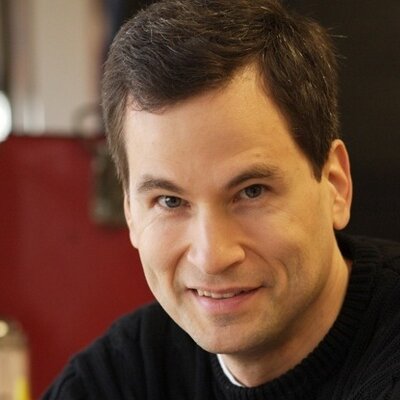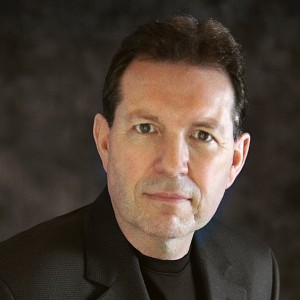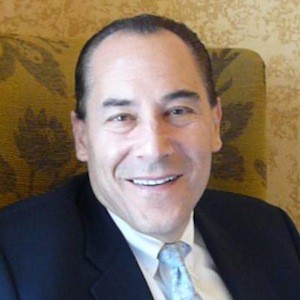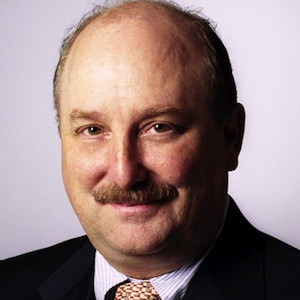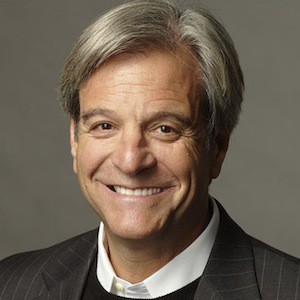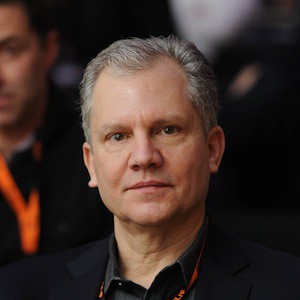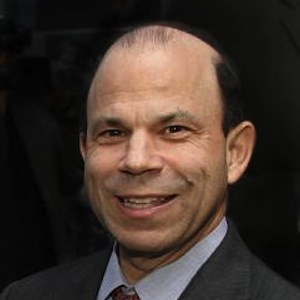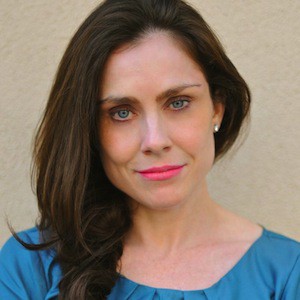John: Hello. I’m here in Connecticut with
David Pogue of Yahoo.
David, why don’t you just start off telling us how you ended
up where you are?
David: Sure. Do you want me to talk to you or to the camera?
John: You can talk to me.
David: Let’s see. My interest was always in magic. I was always a
fan of “I dream of Jeannie” and “Bewitched”, and I was an amateur
magician for many years doing birthday parties and block parties.
My own self analysis is that technology is the closest thing
we’ve got. I can take out my phone in San Francisco and change my
thermostat here in Connecticut, that’s pretty close to magic.
I was a Broadway conductor for 10 years out of college. I
was a music major. I originally started getting into technology for
the purpose of generating sheet music.
That was my first interest in buying a computer, printing
out beautiful types such sheet music. Over time, my clients for…
…what is that?
John: I don’t know. That’s OK.
David: Anyway, I started out as a Broadway conductor right out of
college. I did that for 10 years, playing the piano in the pits. I
started getting interested in computer software because of the
blossoming field of sheet music, types of sheet music.
You know what? I’m just going to…that’s outside. I can
just close this door.
John: OK.
David: Hey guys? Is something going on with the plumbing? We’re
recording here. Can you give us a few minutes?
Woman: Sure.
David: All right, thanks.
David: Working on the plumbing. I was a Music major. Then right
after I got out of college, I went to New York to work in the
theater.
I was a piano player, an arranger, and conductor for
musicals. I’ve always loved musicals. People say, “Oh, you’re a
musician.” It’s really just a theater musician.
I’ve never been a rocker or whatever. I got interested in
computers, because there’s a blossoming field of type-settable
sheet music software that I wanted to get into. That was really the
beginning.
Then I was asked to teach people how to use it, and to write
about these kinds of programs for computer magazines. Before you
know it, I was more in demand as an explainer than as a conductor.
John: Which computer magazine did you start with? Who brought you
in?
David: Well, it originally started in New York. I worked for a
little computer club called the New York Mac User Group. Their
magazine was called the MacStreet Journal. It was an eight-page
xeroxed newsletter.
Then that editor, bless his heart, suggested one day that I
could actually make money doing this. He suggested I send my clips
to Macworld and MacUser, which are big glossy computers…
John: That was about when? What year was that?
David: 1989.
John: ’89, OK.
David: I wrote for Macworld for 13 years. I am sad to announce that
its final printed edition is November 2014. Its run finally ended.
I wrote for Macworld for 13 years.
Then The Times called in the year 2000, and asked if I’d
like to take over the personal technology column. I did that for 13
years.
John: That cycles.
David: Yeah, exactly.
David: So, now, last summer, Yahoo approached me about starting a
Consumer Technology site, a presence there.
They really impressed me. First of all, they were at the
time sort of an underdog. They had a very start-up mentality.
Everybody walked around with this..
David: Last summer, Yahoo approached me about starting a new
Consumer Technology website. It had a very start-up feel to it. I
would hire people I wanted. I would shape it the way I wanted to.
It was a kind of freedom I’d never really had. Yahoo is both
a huge multibillion dollar corporation, but it also feels like a
start-up. All the conversations there center on, “What can we build
now?” and “What should we do next?” which is not a conversation you
hear in old media that much.
John: Yes. You never were a programmer or anything like that. It
was really the magic of the sheet music thing.
David: Yeah. I was never a computer guy, really. I’ve never taken a
computer apart.
I’ve never programmed seriously. To me, that’s my ace in the
hole. I represent the people I’m writing for.
I come to it as an outsider just like they do.
John: Can you think of any Eureka moments over the past 20 years
where you have said, “Wow. This is bigger, more important.” What
moments strike you as far — on your journey of discovery?
David: I am old enough to remember the dawn of the Web.
Actually, the first time America Online came aboard and I was
typing live chat with other people I didn’t know, that was a little
bit of a mind blower.
Then the Web gradually became something for the masses.
That, too, really changed the game.
I remember two products that gave me chills. One was Steve
Jobs first held up the iPhone. I’m like, “That thing has no buttons
and no keys. What is he thinking?”
Man, they saw so far out that day when they showed the
iPhone. That really has changed everything. I mean everything!
The touchscreen Smart phone…I mean it’s now, who buys
radios anymore? Who buys cameras anymore? Who buys newspapers
anymore?
It’s all there. I also remember Apple introducing the
MacBook Air, a laptop, because it got rid of the DVD drive and a
lot of the jacks. It became something else.
It wasn’t really a laptop. I was invited to interview Steve
Jobs after their presentation and it didn’t hit me until I saw it
lying on his desk there. It looked like a cookie sheet lying on his
desk.
It made no lump at all. I was just amazed. To this day, the
MacBook Air is my main machine and it has no moving parts, so it
never dies.
It’s an amazing creation.
John: Did it ever strike you, as you noted, Mac world is close now
to magazine issue. Is that a natural progression? Were you
surprised that papers and publications and the old media just.. the
transformation has been broad?
David: Not surprising. When you look at the big picture of
technology, there are certain things that you can see as parts of
macro trends, so discs for example. They’re all going away.
I mean DVDs are hanging on. They’re going away. Every kind
of disc before them went away.
They’re going away. Things that are stationary and fixed are
going away or minimizing.
Everything has to be mobile and movable and battery powered.
Things on paper, printed things tend to…I mean I love the Times.
I love the people I work with there.
I love my time there. But I can’t think of a single college
kid graduating who gets a home delivery of a newspaper anymore. I
mean there were always be a Times, but will it always be printed on
newsprint?
I’m not sure.
John: How about the relationship with your audience? You noted
that sitting down typing in AOL chatting. You’re a magician.
You always played to your audience. What is that
transformation brought for you that is far more intimate now than
it ever was?
David: The amazing thing about writing about technology in the
digital age is that it’s much more of a performance art than it
ever was writing for magazines. When I worked for magazine, I would
write something in January and it will come out in the April Issue.
I’d forgotten all about it.
When I write a post for the Times or for Yahoo, the
feedback is instant. I mean the comments start filling up.
Definitely, it makes the job harder.
It makes the job more exacting because if you got anything
wrong, they will tell you. Yeah, it’s very much a real time two-way
interaction now with readers.
John: How about the coverage? Do you have coverage expanding over
the years? You always wrote for the user.
Is it with the multiplicity of devices? Are you facing even
bigger challenges than before?
David: My audience by my own choice hasn’t changed. The whole idea
behind Yahoo tech, for example, is to serve this gigantic audience
that’s not served by the geek sites. We have a heavy focus on how
to in troubleshooting and getting started and setting up.
We have a lot of help. We’re aimed at people who are not
technologists. My mission has never changed, same thing at the
Times, same thing in my computer.
The scope of technology has, of course, changed. Now, the
job is just vast. It’s touch screens of every size from tablets to
phones to computers, and the software they run and the web services
that are changing everyone’s lives.
I do almost no reviews of PCs anymore, computers. It seems
like that category reached its maturity. It’s finished evolving.
There’s really nothing new to write about there. These
mobile devices, they never stop. They’re flooding in.
John: Yeah, and they’ve got to keep flooding. You would mention
the…let me step back and ask this. Your relationship with the
companies, has that changed in tech?
You started off as a blogger writing, have you seen that
relationship with companies change as more journalist, more
interest is centered on these companies? In other words, do you
feel that they have the opportunity to bypass you now because they
speak directly to the audience in the way they didn’t before?
David: I guess so. The companies still treat the leading
reviewers as a group to be managed and fed. I think that the
reviews of a product, especially a big one — an iPhone or a
Samsung phone — I still think they have a big impact. The rise of
tech blogs has been very interesting.
It used to be Times, Journal, USA Today and
Newsweek that got the special treatment. Now, the top blogs are
also included in that realm. I’m not sure that the companies
themselves have any more credibility in going directly to the
consumer that they ever did.
John: How about your relationship…How about your relationship
among reviewers? Do you talk to other reviewers?
What’s that relation? Is it competition or camaraderie?
David: It’s very much camaraderie. We all know each other. We all
see each other at the same events.
Nobody ever talks about work. No one ever says, “that
column you did on the new scanner..” No one does that. It’s more like
you’re talking about the event you’re there for. I was just out at
Apple for some unveiling and the whole tech reviewer world was
there and talking more about the free breakfast than about our
work, “Excuse me, we’re working here.”
John: How do you think tech coverage has been over the past 20
years? You’ve been in and of it, but apart from it because of the
review category.
David: It’s interesting how tech coverage has become a thing. The
gadgets you carry have also become a thing. It’s amazing when
you’ve praise or denigrate anything made by Apple, Google,
Microsoft or Samsung.
You hurt people. I mean you hurt them in their core and you
get the most…you get hate mail. You get death threats.
You get the foulest obscenities. That’s something new.
People didn’t have fights like they had over the breakfast cereal
they ate or the brand of car they drove.
It never got to be this red state/blue state but it is now,
and so this thing about tech criticism has become very important to
people in a way it wasn’t 20 years ago. It gives you feeling of
satisfaction that you bought the right thing or it makes you angry
when you hear that you might have bought the wrong thing.
People identify, I think, too much with their gadgets.
Maybe it’s because you invest a lot in it. You don’t want to be
made a fool.
Maybe it’s because there’s fashion statements now; the
phone you carry, the tablet you carry. If somebody says yours
isn’t good, it’s an insult.
John: It’s interesting that you feel it’s much more other types
of criticisms. Others don’t seem to evoke in the audience that type
of reaction.
David: That’s right and it’s strange. What airline do you fly,
what fast-food restaurant do you prefer, people don’t get quite as
uptight about these things.
John: When you first started covering technology and think that
at that point to say tech would change the world, almost seem like
a boast. Now, it has. It’s a fact.
Did you ever feel your existence was threatened by tech? In
other words, the magazine go away, did you see this is existential
threat at all to a way of life or you’re just too adoptable?
David: Did I see this a threat to my life or my career?
John: Yeah, to reviewing…I’m trying to change the question
around from when I talked to reporters covering it. Did you see
this is potentially changing your profession so radically? Some of
them say no.
David: I think that the changes that I worried about were less the
role of a critic. With products coming out so thick and fast, I
think somebody out there to sort through it for you is more
important than ever. I mean the question I get so often is how am I
suppose to keep up?
I bought these phones, cameras six months ago and it’s
obsolete. It’s also getting a lot more complicated and there are no
manuals. They threw it at you and good luck.
I think an explainer role will always be needed. Maybe when my
age is elderly and the kids, who grew up knowing touch screens
and the internet are our age, maybe then these roles will be less
necessary. For the moment, I think this particular job is pretty
critical.
There was a lot of discussion when I left the Times about
whether I was sacrificing prestige, power, or influence. I don’t
know if that’s right.
I know my readership is much greater now. I mean five, six,
ten times more people read my columns and watch my videos at Yahoo
because it’s this gigantic media property. I still feel like I’m
reaching the people I need to reach and a writer writes to be read,
so that’s good.
John: What do you think about the brand question that as a
columnist, as a reviewer, you were your own brand? Often times in
big media companies, it’s the institution that counts more than the
individual. Have you navigated that and how do you see that change?
David: A lot of people mentioned this brand thing like you’ve made
a brand. I promise you, it was a complete accident. I never
intended that. I never considered that. Basically, my career has
been shaped by the phone calls I got so it was the Times who called
and said, “Do you want to do this column?”
Then after I started there, CBS 48 Hours called and said,
“Will you do a profile?” That producer went to CBS Sunday Morning
and said, “Would you like to be a correspondent?” Then I started
doing talks and I started doing books.
It was just because people will ask, “Would you like to…?”
and I’m not good at saying no. There’s never any conscious effort
to build a brand. I did get a sense from the Times that they never
liked names getting bigger than the Times. That made them a little
nervous.
In general, it never bothered each of us. I mean I was very
happy to have the Times’ brand and the Yahoo’s brand now as a
platform. What I want to do is write and perform or whatever it is
that I do.
John: In this industry where there’s been more wealth created,
where there’s been more…The wealth created by this industry is
astonishing. Has that ever been fascinating to you? Did that help
trigger your own?
“Let me take the next step. Let me break the 13-year cycle on this.
There’s something bigger out there. I can get wealthier.”
David: What I do love about this industry is that it is largely
a meritocracy. Mark Zuckerberg, God bless him. He deserves it.
He had a multibillion dollar idea so he deserves it all.
No, I’ve never been interested in being part of that world in the
same way that I love movies and I’ve always been intrigued about
writing screenplays.
I’m not really going to do that either because these are
extremely cutthroat, extremely difficult fields to win in. So many
people want to be the next Mark Zuckerberg but they’re never going
to be. It’s this huge combination of genius, luck, timing and
funding, and it all has to come together like a lightning strike.
I don’t kid myself about ever hoping to tap into that in an
inventor sort of way. But there is Pogue’s theory of geometrical income. When I
was working on Broadway, I was paid a weekly wage to conduct these
shows.
It became frustratingly aware that I would never get ahead.
I would never afford a family. I would never afford to get out of
New York City if I was paid a fixed weekly wage.
I couldn’t see working forever in a system where time
equals a fixed amount of money if there was an alternative which is
a geometrical income. That’s when you strike it big writing a royalty
-based product. That was the one conscious money grab I made.
I decided to try to start running “How To” books. Then if you
do it right, you write once, you’re busy for a few months and then
you collect for years.
I mean it would have been much smarter for me not to choose
technology because those books are dead after one year. Even so,
they have the…I mean wrote six of the “blah-blah-blah” For
Dummies books. We call this the house the Dummies built.
Those books did really well.
John: As you said, that changes very year.
David: Yes, that’s right.
John: Is there any change in the culture of the companies or the
culture of the industry that you’ve noticed over the last 20 years?
By the industry, I mean the tech industry.
David: Yeah. It’s very funny to watch the Apple-ization of the
entire industry. They’re all trying to do what Jobs did.
Now, every product, there’s a press launch in some big
venue in New York or California where a rock star comes on at the
end and the CEO strut across the stage and invites his
lieutenants to do the demos. There’s this secrecy thing.
Everybody keeps their new products under wraps until the
day it’s available. They are all just trying to imitate what Apple
did. It’s pretty funny.
Ecosystem thing, there’s now Google Ecosystem, Microsoft,
Samsung, just like Apple where there’s online components but then
they want you to use their computer, tablet, phone, watch. It’s
wild to see them all imitating that model.
John: Because they’re all obviously seeking monopolization
almost. They’re trying to create monopoly within their family.
David: Yeah, they are. They want to give you velvet handcuffs.
They want to keep you tied into their ecosystem.
Steve Jobs was furious at Android, the operating system,
that as he saw it was a direct ripoff of the iPhones design and I
happen to agree. Icons on a black background, it’s exactly the same
thing.
For a long time, everybody thought the way to get
successful is just to imitate Apple as much as possible. These
days when somebody goes the other direction and they find a truly
new way to do something, I’m really impressed.
Microsoft has phones too, the Windows phone. Six people own
them. They’re a completely different design, not little icons on a black
screen. They really thought through a fresh, functional, beautiful
design.
I guess they were too late with it because nobody’s buying
it. It’s sad when someone does something really great and the
public doesn’t care.
John: Does it surprise you that the news industry as such as the
big media companies can’t innovate or didn’t innovate as rapidly as
they could have?
David: It doesn’t surprise me. I do a lot of speaking and a lot of
speaking I do is for companies. A lot of what the company’s
executives are interested in is what’s happening in the digital
world, what is it about, how do I get into it.
Now, decades too late. Corporate entities in
general are very slow to recognize, to exploit, to understand
the new technologies. It’s not just the old media.
It’s goods and service companies of every size and shape.
When you are a successful company, you’ve been doing things the
certain way and that’s what made you successful.
It would take a very unusual person or leadership to say what we
should do now is abandon that what’s made us successful and try
something unproven. No, they don’t do that very easily. They don’t
do that until they’re pushed to the cliff’s edge and in many cases
it’s just too late.
John: For instance we’ve had the HBO and CBS going on this week, I mean is
I mean is that…there’s another change for you. Particularly for a lover of
movies as this plays out, do you see similar disruption across?
David: Yes. That writing has been on the wall for 15 years. The
world has been telling the cable companies, “We want al a carte
channels. We don’t want to pay $100 a month for 90 percent of the
channels we never watch.”
The cable company said, “Ha-ha, we’re monopoly, you have no
choice.” Now, we’re going to have a choice and the cable companies
are not going to like it. It’s the exact same story over and over
again.
John: How do you think journalists have done covering the
transitions of the last few decades?
David: Journalists, I think, have covered the transitions as
reporters they’re on the outside and so it’s easy to see the
mistakes that are being made and the sluggishness to respond to
changes that companies are making. I tend to think if they had
worked inside for a while, I’m talking about a tech company, for
example, it will give them a little bit of a different insight.
In other words, it’s so easy to be critical until you’ve
been there. Every year, I go to CES, the Consumer Electronic Show, I’ve
been going for years. Every year, I write a very snarky column
about what goes on there.
It’s the size of seven football fields, it’s 3,200 tech
companies with booths. It’s exhausting. It’s noisy.
They’re all trying out the most ridiculous new products,
products that a kindergartener could tell you will fail. Don’t even..that is so
dumb. For a long time, I was like, “How could anyone be so stupid
to pour all these money and man power into a curved television set. A
TV set you have to watch with 3D glasses. No, never going to fly.”
Then this year, it hit me. In every industry, only two out of 10
movies, books, Broadway shows are successful. Restaurants. The
others fail but at the time you’re making them, you don’t know if you’ve
got the hit or not.
Apple didn’t know that the iPad was going to be successful.
In fact, everybody criticized it when it was announced but not yet
for sale. It was a stupid, dead concept.
The bottom line is you have to put out all ten before you
discover which two are going to be the hits. I’m a little more
understanding of these companies and how they work than I was
before.
John: The journalists are in a profession where typically
people haven’t worked in other fields before they get to
journalism. Do you think that…it’s almost you saying, to an
extent, it would be helpful if they worked elsewhere. You said
They’re more inside than outside.
David: Or if they had been there. It’s really interesting to see
PR people and journalists switch roles. The journalists would have much
more tolerance for PR people and what they’re trying to do and vice
versa.
John: One thing that we all gained advantage from the old media
was there was an institutional branding that went up. Now anyone
can write reviews. Anyone can start a blog.
How do the readers learn to discriminate what’s good
information, what’s bad information in a world there’s almost
info-besity, where there’s too much?
David: Well, in the realm of criticism, tech, drama, movies,
restaurants, travel, those critics become stars to guide you. You
have to learn a critic. For example, there’s one critic at the
Times who I considered to be wrong every single week and that’s a
useful data point.
Right? I know that I should go to the productions that that
person didn’t like. In the same way, I don’t resent rising stars.
It is a meritocracy, it’s the American way. If there’s some
19-year-old, in fact, there is, there’s a kid on YouTube who does
tech reviews, he’s just a guy with a camcorder. He gets millions of
views because he’s interesting, he’s personable, he says what
people want to know.
I don’t begrudge that at all. If I’m eclipsed by somebody
better and more entertaining, that’s the way it should be. I’ll
find something else.
The answer to the critic question is yes, you have to learn
a certain critic, whether it’s an independent or part of a
corporation.
John: Exactly. You’re optimistic. You see this world ahead of us.
It still is wide open.
David: I am certain that there will always be a need for curated
information and this is news, this is publishing and this is
criticism. The world will always need something more than a sea of
amateur bloggers whom they don’t know. In that way, yes, I’m
optimistic, but there will be always a need for institutional batch
of journalism.
John: Thank you very much.
